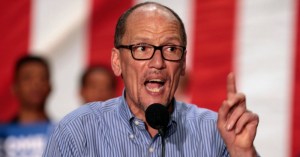The Most Pressing Issue for Our Next President Isn’t Medicare
The climate science is clear: it’s now or never to avert catastrophe
 I couldn’t watch the last Democratic debate. I was busy talking politics with two friends, which was more enlightening than what the Dems offered. The debate format is just not for serious debate. It’s mostly for probing your opposing candidates’ weaknesses, establishing your own bona fides, and coming up with a quotable crumb for the press.
I couldn’t watch the last Democratic debate. I was busy talking politics with two friends, which was more enlightening than what the Dems offered. The debate format is just not for serious debate. It’s mostly for probing your opposing candidates’ weaknesses, establishing your own bona fides, and coming up with a quotable crumb for the press.
The Democrats seem pulled between two opposing forces—what the polls show to be the dominant issues for voters and what are in fact the most pressing issues. That is to say, they haven’t yet found the right political formula to move the voters left. Climate change, the world’s most urgent and least fixable problem, got less than 10 minutes’ consideration in the debate. And so the pattern of denial continues.
. . . Climate experts also worry that a lack of specific policy with price tags and the limitations of a debate format relegate the topic to low priority, even as Wall Street and Corporate America step up their own attention on the issue.
Wednesday’s question lineup was also reflective of current headlines. The Trump impeachment hearings, taxes and foreign policy dominated the debate.
And the outrageous amount of time devoted to health care in earlier debates is just pandering to what the Dems perceive to be voters’ concerns. As some of you know, I worked on the Clinton heath care reform in ’93-’94 and understand how deep the problem is. It’s the most immediate and pressing issue for most voters.
But other big challenges loom, not just with climate but with the parlous state of American democracy, as David Leonhardt mentioned. Consider: voting rights, the collapse of the GOP, the rank inequality in our country, energy, the middle class erosion. Yet, in a sense they are all tied in to climate change.
People like Bill McKibben have been ringing the alarm bells for a long time. Maybe the noise (along with increasingly strong and numerous protests) has finally penetrated a few brains.
McKibben says the climate crisis doesn’t work anything like the health care crisis. The math is against us and the scenario for reducing emissions to nothing in twenty years is an “ungodly steep slope.”
Here’s another way of saying it: the Intergovernmental Panel on Climate Change reported last autumn that if we hadn’t managed a fundamental transformation of the planet’s energy systems by 2030, our chance of meeting the Paris temperature targets is slim to none. And anyone who has ever had anything to do with governments knows: if you want something big done by 2030, you better give yourself a lot of lead time. In fact, it’s possible we’ve waited too long: the world’s greenhouse gas emissions spiked last year, and—given Trump, Bolsonaro and Putin—it’s hard to imagine we won’t see the same depressing thing this year.
2030: that’s only ten years, Democrats. Are Sanders and Warren the only ones talking candidly about climate? If Booker, Klobuchar and Harris want to revive their faltering campaigns, getting serious about climate might be a way to start.








